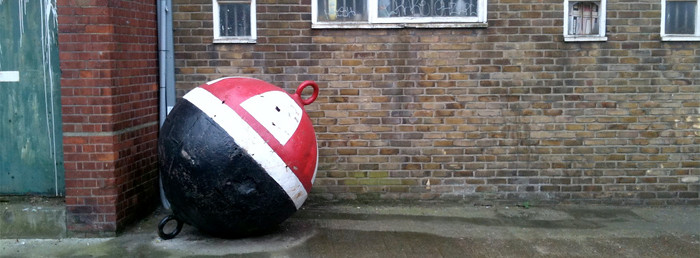This post is the first of seven posts about the future. Caveat lector.

“Hauntology is a coming to terms with the permanence of our (dis)possession, the inevitability of dyschronia.
“I repeat, I re-cite: hauntology is the closest thing we have to a movement, a zeitgeist, at the moment (and one of the uncanniest aspects of it is the fact that there seem to be very few lines of explicit influence among the artists involved).”
—Mark Fisher (k-punk)
Hauntology, already old, is about six months away from becoming the title of a column in a Sunday supplement magazine; of going the way of psychogeography. The two have much in common: one concerns expeditions in space, the other in time. (“Kant thought that space was the form of our outer experience, and time the form of our inner experience”—Svetlana Boym, The Future of Nostalgia.)
Both are also easily misunderstood, oversimplified, and recuperated. Before that happens, we might as well attempt to wring something useful out of it. It’s been knocking around the music/philosophy blogs for a while, so it’s probably time to think about it in the literature space.
Hauntology in one sense is a term for a certain strand of music, characterised by the sampling or emulation of old times and old effects: childrens’ TV themes and the BBC radiophonic workshop, Oliver Postgate and 90s rave. That glib recitation is another waymark on the road to recuperation, but. Read more, and more widely.
Hauntology is also a network effect engendered by the increasing apparent* flattening of history and time. The network, fragmented and unevenly distributed, induces a growing sense that alternative worlds are very close indeed.
( * The internet only appears to be flat, as we perceive it in two dimensions. In fact, the knowledge it embodies, because it is tied to and instantiated in time, is ever receding from us, darkening and thickening and coming apart, becoming harder to reach and harder to find. The past is intractable but loosened, suffering our gaze upon it and our endless reinterpretations of it.)
As such, it is amenable to the same critical apparatus as Network Realism: indeed, it may be a part of the same thing.
“Ghost Box and, in particular, Belbury Poly are not inspired by the hackneyed futurism that pulsed through earlier electronic music. Their interest lies in lost worlds and an England imagined as Arcadia, in tracks such as Pan’s Garden, which sounds, thrillingly, like morris-dance music made with synths.”
(“Hackneyed futurism” is key here: the future we were promised, of living in space, of jetpacks and pellet foods, is simply not going to happen. And while we reject the macho dark survivalist future of envirotechnological collapse, we also must give up the NASA-Concorde extopia we have been pining for forever: these are the futures of an extinguished past, a worldline that didn’t work out, a dead end.)
While I understand the distinction between nostalgia and hauntology, I am unconvinced by their separation in the application of the latter to music. The two most frequently cited sonic hauntologists are Burial and Ghost Box records, and while I’m a huge fan of both, I also see them as being steeped in nostalgia.
I am so bored of nostalgia. Of letterpress and braces and elaborate facial hair. I appreciate these things, but I think there’s something wrong with a culture that fetishises them to the extent that we currently do.
As if authenticity is only to be found in the past. I think we are frightened and I think we are distrustful and we are worried that things are slipping away. (This is something I am going to address separately.)
What would a hauntological literature look like? I’m not sure, and that makes me suspicious. The two things that come to mind are Borges (surprise!) and starpunk, which I’m also going to write about separately.
Much hauntology fails because it continues to assert a backwards/forwards model of time, a resurrection of an imagined past which is still too drenched in pure nostalgia to serve any revolutionary purpose.
Hauntology feels like a symptom of future shock, a reaction. Caisson disease: a form of the bends brought on by too rapid changes of pressure when moving between the different levels (pressurised chambers) of the caissons used in building bridges. A symptom of the unevenly-distributed future, the isobars of our ever-shifting and expanding culture.
Another test of hauntology is how it stands up to other reactions to present conditions. Bill Drummond’s The17 project is an attempt to reimagine music, its genesis in a rejection of the past. (The book.)
He imposes a restriction: “only listen to music written, recorded or released in the previous twelve months by composers, soloists or ensembles who have never released music in any format at any time previous to the last twelve months.”
But, Bill is disappointed: “everything I bought sounded like something I had heard 10, 20, 30 years before.”
Out of this, and a number of other realisations, comes The17. This is the opposite of hauntology: to demand the radically new. Hauntology reinvigorates, reanimates the past—allegedly—turning the old musics to new purpose, much as Borge’s Pierre Menard does to the Quixote.
I think my problem with hauntology is that it deals with the problem of the future by going back to the past. And that is fine: but it will not save us.
[…] I think my problem with hauntology is that it deals with the problem of the future by going back to the past. And that is fine: but it will not save us. […]
Pingback by Warren Ellis » Bookmarks for 2011-03-20 — March 21, 2011 @ 7:00 pm